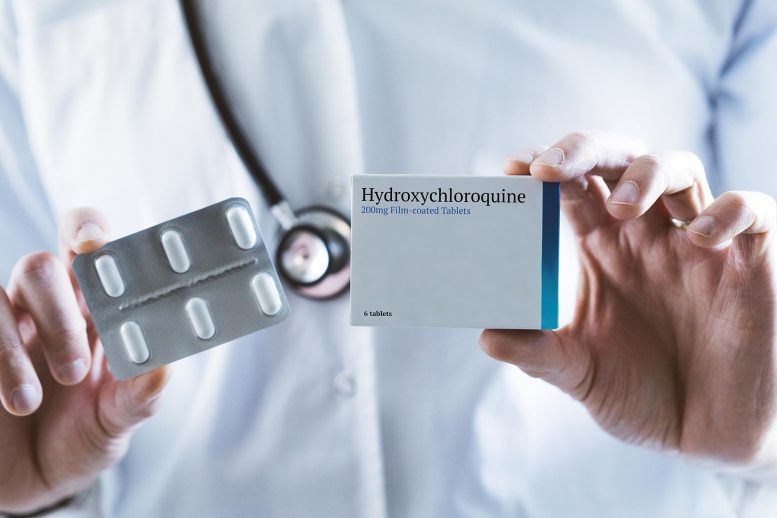
Hydroxychloroquine (HCQ) ineffective as a preventive antiviral against COVID-19.
Researchers at Case Western Reserve University have added to the growing body of understanding about how hydroxychloroquine (HCQ) is not a possible defense against COVID-19.
Specifically, they found that HCQ is not effective in preventing COVID-19 in patients with lupus and rheumatoid arthritis (RA), suggesting a broader interpretation of HCQ as ineffective preventive medicine for the general population. Their findings were recently published in the Annals of the Rheumatic Diseases.
Many researchers have focused on patients with systemic lupus erythematosus (SLE) and RA because HCQ is frequently taken by these patients. Anecdotal reports in the early stages of the pandemic showed these patients were not getting COVID-19. Earlier researchers then explored HCQ in the lab and found it effective against the virus, in addition to its already established anti-inflammatory properties, so testing in people for prevention or treatment at first held some promise. Since those early tests, various more recent studies have shown that HCQ is not effective in treating moderate-to-severe hospitalized cases. Treatment with HCQ early in the disease or for mild cases is still under review.
“Our study shows, with a large degree of confidence, that HCQ is ineffective as a preventive antiviral in people with SLE and/or RA taking drugs that suppress their immune system, putting them at greater risk,” said Mendel Singer, Ph.D., MPH, lead author and associate professor and vice chair for education in the Department of Population & Quantitative Health Sciences at the Case Western Reserve School of Medicine. “Given how the study was structured, one can make an educated extension that it is not effective in preventing COVID-19 in people without those conditions. It is not uncommon for something to show promise in the lab, and then prove ineffective in the more complex biological landscape of humans.”
The Case Western Reserve team drew on a large national database, pulling de-identified patient data from 36 health systems, to compile a much larger study than previous work, looking at patients with SLE and/or RA and their health outcomes related to their use of HCQ. Prior studies had fewer than 20 COVID-19 patients with SLE and/or RA; this study had 159. This study showed that patients with SLE and/or RA who contracted COVID-19 were just as likely to be taking HCQ as SLE and/or RA patients who did not get COVID-19.
“By drawing on data from a relatively large patient population with lupus and/or RA, we can offer a higher level of confidence in our findings,” said Singer. “We see from this large retrospective review that this drug is ineffective in preventing COVID-19 in these patients who have been taking HCQ. If HCQ were effective in prevention, we would have seen fewer HCQ-taking SLE/RA patients with COVID-19, but did not. This likely means that HCQ is not active against the SARS-CoV-2 virus in humans — versus in the lab — and is unlikely to be an effective preventive antiviral for anyone.”
Reference: “Response to: ‘Hydroxychloroquine ineffective for COVID-19 prophylaxis in lupus and rheumatoid arthritis’ by Singer et al” by Manuel Francisco Ugarte-Gil, Maximilian F Konig, Peter Korsten, Francis Berenbaum, Alfred Hyoungju Kim and Jeffrey A Sparks, 5 August 2020, Annals of the Rheumatic Diseases.
DOI: 10.1136/annrheumdis-2020-218683
Singer was joined in this study by David Kaelber, MD, Ph.D., MPH, professor of internal medicine, pediatrics, and population and quantitative health sciences and co-director of the Center for Education and Training in Health Informatics at the School of Medicine and chief medical informatics officer at The MetroHealth System; and Maria Antonelli, MD, assistant professor of medicine at the School of Medicine and a rheumatologist at The MetroHealth System. The TriNetX Research Network, a federated health-research network that aggregates blinded electronic health records from 36 U.S. health-care organizations, provided the patient data.

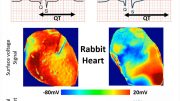

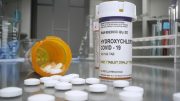
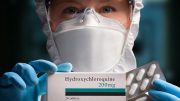


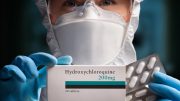
Well this is what I call BULLSH*t. How can they infer that “one can make an educated extension that it is not effective in preventing COVID-19 in people WITHOUT those conditions”; “This likely means that HCQ is not active against the SARS-CoV-2 virus in humans — versus in the lab — and is unlikely to be an effective preventive antiviral for anyone.”
This study is only about people with “SLE and/or RA taking drugs that suppress their immune system”. They only have the data to conclude “that HCQ is ineffective as a preventive antiviral” in people with these conditions.
And then people wonder why there is an increasing distrust in science… I can only see this as pushing an agenda to manipulate science and people’s opinions. This has been happening since science was born and still so many smart people deny it.
Can we please stop wasting good money after bad on this snake oil therapy?
And then only a week later the largest study to date shows that this drug reduces the death rate by a whopping 30%. You might want to open your mind and realize you are being manipulated. By the end of all this, this drug will be fully proven to be a major tool against Covid….
Its a protocol not a single drug. HCQ is a zinc inopher. It gets zinc into the cell. It does little to fight covid directl. I find it hard to beleive that these doctors dont know this. It seems that most of these studies that find no effect were priori set up to fail by never ever doing the complete protocol and/or giving it to late stage infected when its already too late.
Either the researchers at Case Western Reserve University are inept or deceitful. According to the scientific method, one of the task before forming a hypothesis is to research existing information on the problem. In two studies, one published in 2010 [1] and the other published in 2014 [2], it was determined that hydroxychloroquine acting as a potentiator in a comedication containing hydroxychloroquine and zinc supplement would inhibit virus growth, the Zn2+ ions inhibiting RNA dependent RNA polymerase (RdRp), RdRp being the mechanism for replicating coronavirus (or any other RNA virus). I am just a mathematician and I identified these studies back in April. Frankly, their study and this article read like just another Gilead Sciences hit piece.
[1] “Zn2+ Inhibits Coronavirus and Arterivirus RNA Polymerase Activity In Vitro and Zinc Ionophores Block the Replication of These Viruses in Cell Culture”: https://journals.plos.org/plospathogens/article?id=10.1371/journal.ppat.1001176
[2] “Zinc Ionophore Activity of Quercetin and Epigallocatechin-gallate: From Hepa 1‑6 Cells to a Liposome Model”: https://moscow.sci-hub.tw/2733/3287e032ba9fd1726a328756c0018198/dabbagh-bazarbachi2014.pdf
Making a record that this completely baseless HCQ article was top hit for Google News Aug 19, 2020. What a shame. Massive class action lawsuits are coming for the manipulation of the HCQ information. Many are guilty, the cost will be immense. This provides zero evidence of anything related to HCQ and Covid. Looking at 159 “de-identified” patience who had Lupus and Covid and finding that some were taking HCQ proves nothing…. seems like an idiotic data point to focus on… my guess is that a more rational data point might show a positive effect, so they highlighting an obscure finding. The fact that they are drawing the conclusion they are drawing gives away their original intent and goal. No unbiased person would draw these conclusions.
Competing interests of the authors of this “response” paper is telling. Don’t branish bad science for POLITICS. SHAME
It seems to me that of all those databases, finding only 159 patients who have SLE or rheumatoid arthritis and COVID-19 may suggest that fewer patients on HCQ are in fact getting COVID. Is 159 a large amount out of all the number of SLE/RA patients in those databases? I would like to know that statistical breakdown before I judge HCQ ineffective. Obviously it does not work for everybody but maybe it does prevent infection in some…or allow zinc into the cell to do the work.